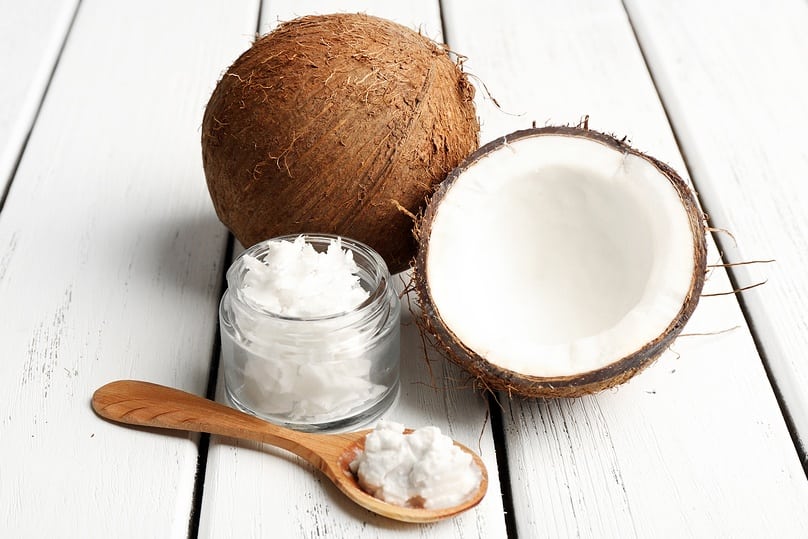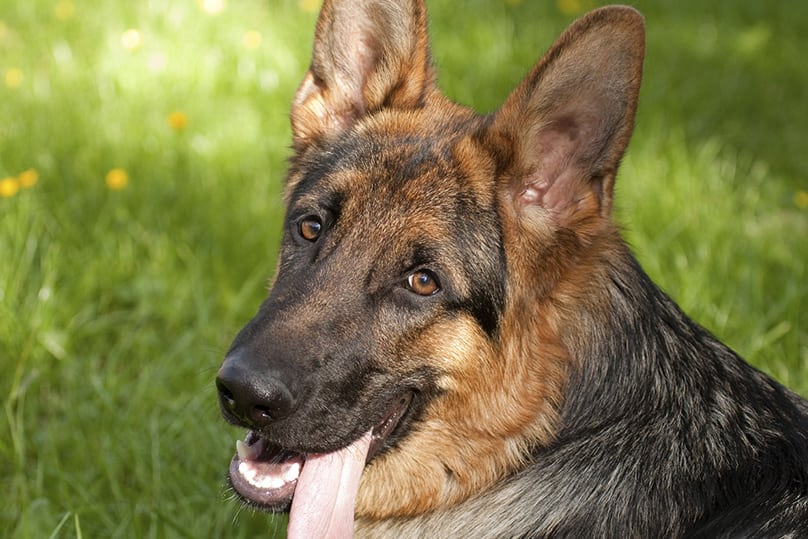Coconut Oil for Dogs

With rich amounts of medium-chain triglycerides, a type of saturated fat beneficial to a canine’s health, coconut oil is a great nutritional supplement for the canine diet. Coconut oil is edible oil extracted from mature coconut meat of the coconut palm tree. Slow to spoil (oxidize) coconut oil can last up to five or six months when stored between 72 °F and 75 °F, which makes it even more advantageous for maintaining your dog’s health and well-being.
Coconut oil also offers vitamin K and E in small but beneficial amounts. Vitamin K contributes to your dog’s bone and brain health and acts as an anti-inflammatory and antioxidant to help reduce infections and diseases. Vitamin E keeps your canine’s skin moisturized, supports nail health, stimulates fur growth and gives his coat a healthy, natural sheen.
Coconut Milk vs. Coconut Oil
Be careful not to confuse coconut oil with coconut milk. Coconut oil is made by separating oil from coconut milk using fermentation. Following fermentation, coconut milk will contain all the protein and carbohydrates while coconut oil contains minimal to no proteins or carbs. Although coconut milk is safe for canines to drink, it doesn’t have the MCTs and other nutrients that provide strong support for your dog’s skin, coat, and general health.
What are Medium-Chain Triglycerides and Why are MCTs Good for Your Dog’s Health?
MCTs are biologically inert energy sources the canine body finds simple to metabolize and use to support a variety of processes, such as manufacturing enzymes and proteins. Medium-chain triglycerides also diffuse from your dog’s gastrointestinal tract without needing to transform chemically. People and animals suffering malnutrition, metabolism disorders, and malabsorption are often given coconut oil to promote weight gain and facilitate rapid absorption of nutrients by the body.
The Benefits of Lauric Acid
Coconut oil is nearly 50 percent lauric acid, a saturated fatty acid that is converted by chemical processes in your dog’s body into a monoglyceride compound called monolaurin. With dynamic antimicrobial, antifungal and antiviral properties, lauric acid eradicate pathogens by destroying their membranes. In fact, lauric acid has such strong antiviral properties that researchers are investigating its effectiveness against fighting HIV/AIDs. Unless the canine (and human) body has access to plentiful sources of lauric acid, monolaurin cannot be produced and its excellent health advantages utilized.
Coconut Oil for Dog Skin Health
By providing your canine with the nutritional benefits of medium-chain triglycerides, vitamin E, vitamin K and protein support found in coconut oil, you will notice your canine’s coat becoming softer, fuller and more lustrous as the oil works its magic. In addition, coconut oil can improve skin health for dogs suffering from:
- Dermatitis
- Food allergies
- Flea allergies
- Eczema
- Acral lick granulomas
- Itching, scabies, rashes and patchy baldness

You can also use coconut oil topically to provide rapid relief from itchiness and irritation due to bug bites, sores and minor wounds on your dog’s skin. Coconut oil’s antifungal and antibacterial qualities not only helps sterilize open sores but can prevent and treat candida and other yeast infections. Usually taking the form of ear infections, yeast infections in dogs are common when yeast is allowed to proliferate in the warm, dark, moist area of the canine middle ear.
Health problems like allergies, bacterial infections, and flea allergies often cause ear infections. Regularly supplementing your dog’s diet with coconut oil and probiotics will suppress numerous canine infections through its antibacterial and antioxidant activity as well as the ability of coconut oil to promote the production of proteins.
Taking Care of Your Dog’s Paws with Coconut Oil
A dog’s paw pads are essentially a type of skin. Thick, tough and composed of connective, fatty tissue, canine paw pads enable canines to walk on just about any surface. Just like regular skin, paw pads are subject to cracking, drying, sores and infections. By adding coconut oil to your canine’s diet, you can help keep his paw pads moisturized, healthy and nourished with sufficient amounts of protein and vitamin E essential for good skin health. If your dog’s pads are dry and cracked, rubbing coconut oil on them will soothe, heal and moisturize them.
Superfood Benefits for Super Dogs
Coconut oil’s anti-inflammatory properties combined with medium-chain fatty acids make it a great, holistic treatment for relieving arthritis pain and stiffness in senior canines. Additionally, coconut oil given to senior dogs supports signaling among brain cells, keeps their body and mind active and may contribute to maintaining a healthy weight due to its metabolism-enhancing activity.
For canines with chronic halitosis but no signs of oral disease, coconut oil may reduce “doggy” breath. Canines that really love the taste of coconut oil may even allow their owners to brush their teeth with coconut oil–without too much of a fuss!
Other benefits of coconut oil for dogs include:
- Improves nutrient absorption and digestive processes
- May support healing of colitis and inflammatory bowel syndrome
- May decrease risk of cancer and heart disease due to its powerful antioxidant effects
- Balances and regulates insulin levels to control or even prevent development of diabetes
- Promotes normal functioning of the canine thyroid
How to Give Your Canine Coconut Oil
Start giving your dog coconut oil in small amounts until you see how well your dog responds to it. Ten to fifteen-pound canine should be given between a 1/2 teaspoon and one teaspoon daily to benefit from the positive health effects of coconut oil. Twenty-pound dogs should receive two teaspoons, with larger canines getting one teaspoon per meal (breakfast, lunch, and dinner). Coconut oil can be added to dog food or given to the dog directly if he really likes the taste of coconut oil. If you do not notice improvements in your canine’s skin and coat after six weeks, you might try adding more coconut oil to his diet. If your dog develops loose stools, reduce the amount of coconut oil in his diet.